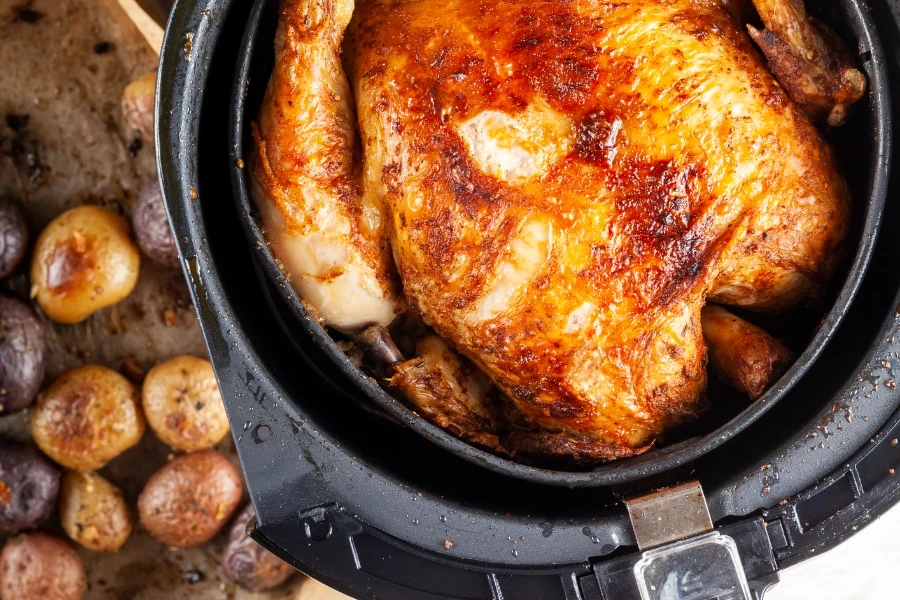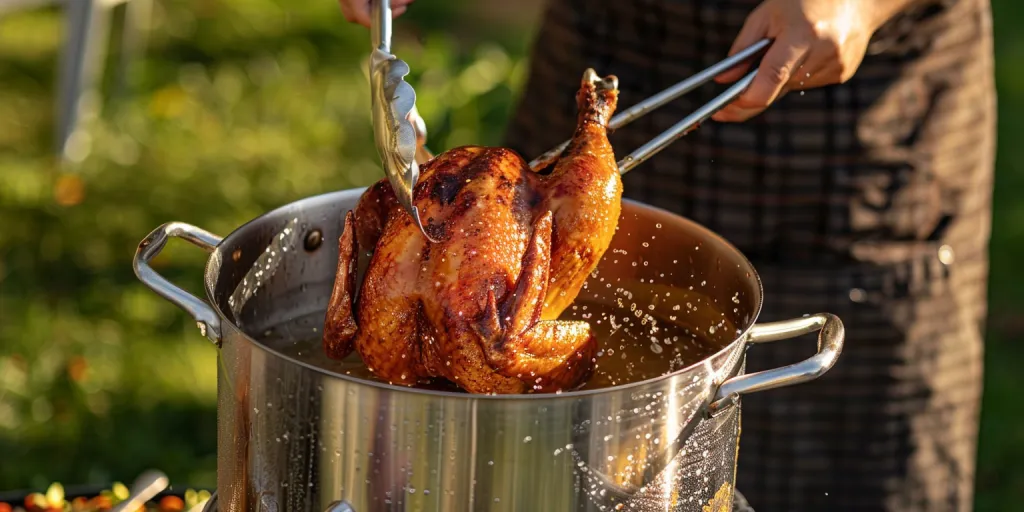The quest for the perfect turkey fryer involves understanding its intricacies, from safety features to its multifunctional capabilities. This article aims to demystify turkey fryers, providing readers with a comprehensive understanding of this kitchen machinery. Whether you’re a seasoned chef or a curious home cook, knowing what to look for in a turkey fryer can elevate your cooking experience. Let’s explore the essential aspects that make turkey fryers a sought-after appliance for culinary enthusiasts.
Table of Contents:
– Understanding turkey fryer safety features
– The versatility of turkey fryers in cooking
– Key considerations before purchasing a turkey fryer
– Maintenance and cleaning tips for turkey fryers
– The environmental impact of using turkey fryers
Understanding turkey fryer safety features

Turkey fryers, while enhancing the cooking experience, come with their set of safety considerations. Firstly, the importance of temperature control cannot be overstated. A fryer with a precise temperature gauge ensures the oil is neither too hot nor too cold, reducing the risk of accidents. Additionally, models equipped with automatic shut-off mechanisms activate when the oil reaches dangerous temperatures, providing an extra layer of safety.
Secondly, the design of the turkey fryer plays a crucial role in safety. A stable base prevents tipping, a common cause of fryer-related accidents. Fryers with a solid construction and secure footing are essential, especially when used in outdoor settings.
Lastly, the inclusion of safety accessories, such as gloves and fryer baskets with cool-touch handles, protects users from burns. Manufacturers have increasingly focused on these accessories, acknowledging the importance of user safety during operation.
The versatility of turkey fryers in cooking

Turkey fryers are not limited to just frying turkeys. Their versatility extends to a range of cooking techniques, making them a valuable addition to any kitchen. For instance, many models are suitable for boiling and steaming, allowing users to prepare a variety of dishes, from seafood boils to vegetable steams.
Moreover, the size and capacity of turkey fryers cater to large-scale cooking, ideal for gatherings and family dinners. The ability to cook a whole turkey evenly and efficiently is a testament to the fryer’s capability, but exploring its multifunctionality can lead to new culinary discoveries.
Experimenting with different cooking methods in a turkey fryer can enhance flavor profiles and textures. Whether it’s frying, boiling, or steaming, the fryer’s adaptability opens up a world of possibilities for creative cooking.
Key considerations before purchasing a turkey fryer

When in the market for a turkey fryer, several factors need consideration to ensure it meets your needs. The fryer’s capacity is paramount; it should be large enough to accommodate the size of turkeys you plan to cook. A fryer too small limits the size of the bird, while an excessively large fryer may prove inefficient for smaller quantities.
Energy efficiency is another critical aspect. Fryers designed with energy-saving features not only reduce operational costs but also contribute to environmental sustainability. Look for models with high energy efficiency ratings to maximize cost-effectiveness.
Furthermore, the type of turkey fryer—whether oil-based or oil-less—significantly impacts the cooking process and outcome. Each has its benefits, with oil-less fryers offering a healthier cooking method and oil-based fryers providing traditional, crispy results. Understanding the differences can guide you to a choice that aligns with your culinary preferences.
Maintenance and cleaning tips for turkey fryers

Maintaining and cleaning a turkey fryer extends its lifespan and ensures safe operation. After each use, it’s crucial to thoroughly clean the fryer to prevent oil buildup and potential fire hazards. Draining the oil and wiping down the interior with a degreaser can remove residue effectively.
For deep cleaning, disassembling the fryer parts and soaking them in soapy water can tackle stubborn grease. However, always refer to the manufacturer’s instructions to avoid damaging sensitive components.
Regular maintenance, such as checking the gas lines in propane fryers for leaks and ensuring the electrical components in electric fryers are in good condition, is essential for safety and performance.
The environmental impact of using turkey fryers

The environmental consideration of using turkey fryers is an aspect users increasingly acknowledge. The disposal of used cooking oil poses a significant environmental challenge. Proper disposal methods, such as recycling the oil for biodiesel production, can mitigate this impact.
Additionally, choosing energy-efficient turkey fryers reduces carbon footprint, aligning with sustainable cooking practices. Awareness and responsible use of turkey fryers can contribute to environmental conservation efforts, making it a consideration worth exploring for eco-conscious consumers.
Conclusion:
Turkey fryers offer a blend of versatility, efficiency, and culinary excellence, but understanding their safety features, maintenance requirements, and environmental impact is crucial. By considering these aspects, users can enjoy the benefits of turkey fryers while making informed, responsible choices. Whether you’re hosting a large gathering or experimenting with new cooking techniques, a turkey fryer can be a valuable addition to your culinary arsenal, provided it’s chosen and used thoughtfully.




